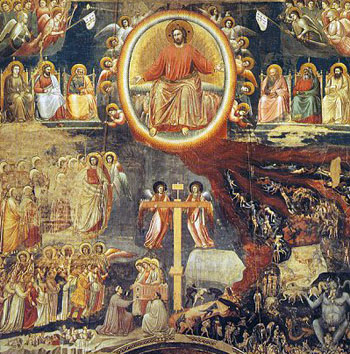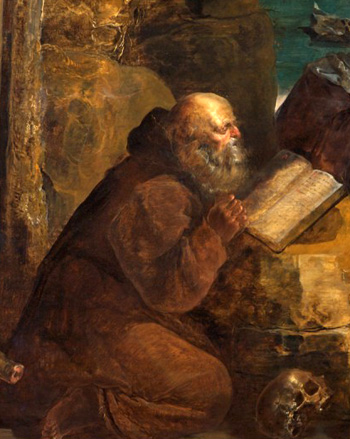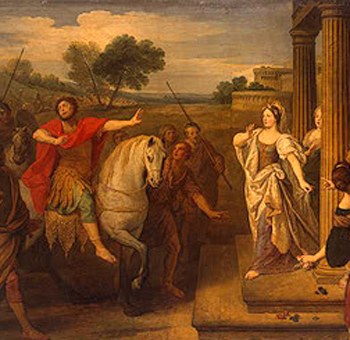Gaining the Kingdom of Heaven
through True Charity
Today we heard the Parable of the Royal Banquet. Christ describes God's
plan as a Royal Banquet, a theme that is related to the gaining of the
Kingdom of Heaven and, above all, the way to reach it: Through Charity,
which manifests itself fundamentally through three main points: - The constitution of the Kingdom of God: that is, hierarchical and exclusive.
- Detachment from the world: that is, to live in the world, but not to be of the world.
- The restoration of all things in Christ (as St. Pius the X would say): that is to fight for His Reign.
Now, the word Charity comes from the Greek ἀγάπη and means “the highest form of love, the love of God for man and of man for God." Because God has loved us first is why we can love Him and why we should love our neighbor. Christian charity must always be motivated by the love of God and the defense of Truth. Otherwise, it profits nothing. These are not empty words, for today many notions of false charity abound.
 The master orders his servant to bring in the poor, crippled, blind and lame
The master orders his servant to bring in the poor, crippled, blind and lame“If I should have prophecy and should know all mysteries, and all knowledge, and if I should have all faith, so that I could remove mountains, and have not charity, I am nothing. "And if I should distribute all my goods to feed the poor, and if I should deliver my body to be burned, and have not charity, it profiteth me nothing.
"Charity is patient, is kind: charity envieth not, dealeth not perversely; is not puffed up; Is not ambitious, seeketh not her own, is not provoked to anger, thinketh no evil; Rejoiceth not in iniquity, but rejoiceth with the truth.” (1 Cor 13:2-6)
As we can see, we Catholics have the panorama very clear: Everything we do must be done for the greater glory of God.
Many cultures have been born and prospered, and have disappeared. Some of them promoted great ideals: the Greeks, for example, sought knowledge and beauty, the Romans, fidelity to the fatherland and the defense of the family, the Japanese, honor and discipline.
 Rome generated a great civilization, but much less than Christendom
Rome generated a great civilization, but much less than ChristendomSt. Alphonsus of Ligori wrote one of the most famous Christmas carols that is still sung today in Italy, in which he exclaims: “Tu scendi dalle stelle, o Re del Cielo, e vieni in una grotta, al freddo al gelo, o Bambino mio Divino, io ti vedo qui a tremar, o Dio Beato, ahi, quanto ti costò l'avermi amato!”
(From starry skies descending, thou comest, glorious King, a manger low Thy bed, in winter's icy sting; o my dearest Child most holy, shudd'ring, trembling in the cold!, great God, Thou lovest me!, what suff'ring Thou didst bear, that I near Thee might be!)
This reminds us exactly of the epistle we hear today; in it St. John tells us: “In this we have come to know His love, that He laid down His life for us; and we likewise ought to lay down our life for the brethren.” (1 Jn 3:16) As we see, all the good we do, we must do it out of love for God.
A false charity
Now, what should we think of a philanthropy without God? Well, it is satanic. Yes, that exactly. Satanic. I know some people will think this is exaggerated, but it is not. It is the constant teaching of the Church that has been sadly put aside since Vatican II.
 Not real charity: English Masons raise millions to prevent domestic abuse
Not real charity: English Masons raise millions to prevent domestic abuseThat said, it is true that sometimes it can be difficult to take a Catholic position. Especially when it is scandalous to see how atheists and heretics seem to do more charitable works than those who claim to believe, those who believe themselves to be children of God, but this is part of the way of faith: to reject the mirages and temptations the world creates in order to separate us from the truth.
The truth is that whoever does charitable works without true love for God, "it profits him nothing." Freemasons and their fund-raising social clubs will not be saved from Hell because of the amount of money they can raise, even if this be millions.
Kingdom of God is hierarchical & exclusive
This brings us to another important point: The hierarchical and exclusive constitution of the Kingdom of God. Yes, Christianity is exclusive per se. You cannot be a Christian and an antichrist at the same time. Moreover, Heaven itself is populated by an "elite" assembly of men and women who were faithful to Christ until the end.
 A protrayal by Giotto of the Kingdom of Heaven as hierarchical and exclusive
A protrayal by Giotto of the Kingdom of Heaven as hierarchical and exclusiveToday, perhaps in our own families, there are those who do not accept God. We should pray for them, but not disproportionately be attached to them. Each one of us will be judged independently and those who manage to enter the Celestial Kingdom will be like angels.
And if you think I am being very hard, listen to these words of the Divine Master: “Do not think that I came to send peace upon earth: I came not to send peace, but the sword. For I came to set a man at variance against his father, and the daughter against her mother, and the daughter in law against her mother in law.” (Mt 10:34-35)
Obviously this was not the end or design of the coming of Our Savior; but His coming and his doctrine had this effect: setting the son against the father, the daughter against her mother, etc.
This is because of the obstinate resistance to grace that many made and still continue to make, an obstinacy seen principally in the perfidious and proud who did not accept the Messiah and persecuted all whose want to adhere to him. To those the King said: “None of those who were invited shall taste of my supper.”
Detachment from the world
Now, the exclusivity of the Kingdom of God leads us to another important point: detachment from the world. To become detached from the unhealthy love of those who do not love God is not the only difficult thing we have to do. Another hard thing is to become detached from the farm, the oxen and human love.
This detachment means establishing priorities. You have to love God above all things and also and above all others.
 Not all are called to a life of celibacy, but all are called to detachment from the world
Not all are called to a life of celibacy, but all are called to detachment from the world There are those who consecrate their lives with a radical detachment from family and the word, detached from the material, having no will other than to do the will of God and live in celibacy. These persons undoubtedly have a superior vocation and a transcendental mission, especially in the combat of the modern world because they are living testimonies in the imitation of Christ. To the degree you dedicate your life entirely to God, others can see the path to God more clearly through your life.
Now, not all celibacy is good. A celibate without the purpose and intention of doing everything for the glory of God leads a miserable life. And, here, we return to the need for Charity. Many Greeks made vows of chastity in honor of false gods or for philosophical reasons.
In the Old Testament we see that the daughter of Judge Jephthah cries in sorrow because she will remain a virgin due to the imprudence of her father. (Judges 11:29-40) He went to war and promised God that – if he obtained the victory, he would sacrifice to God the first person who came to greet him.
 Jepththah's daughter comes to congratulate his victory
Jepththah's daughter comes to congratulate his victory As we can see, without a supernatural purpose, any sacrifice, including throwing oneself into the fire, is grievous and profits nothing.
Finally, we must remember that charity always involves seeking the restoration of all things in Christ, to fight so that He reigns, and to battle against those who hate Him. This was very clear, for example, to St. Jerome, who, moved by Charity, said: "I have put all my efforts into making the enemies of the Church my personal enemies."
Finally, among the last lines of the Gospel of today, we hear a firm command of the King: “Go out to the roads and country lanes and compel them to come in.”
Christ is King and He must reign both in our homes and in society. We must put all our efforts into making this happen. It does not matter if our actions are large or small. What matters is that, out of charity, we should try to save the souls we can. We have to do this, of course, respecting proper priorities, that is, not putting our own souls in unnecessary danger, but also not excusing ourselves from doing what we can do.
Let us always remember that the right of the Church to be heard does not come from the people but from Christ, and that, as St. Justin the Martyr said, "Everyone who can speak the truth and then does not do so, will be judged by God." May the King never allow us to hold Him as less important than a farm, an ox or a marriage.

